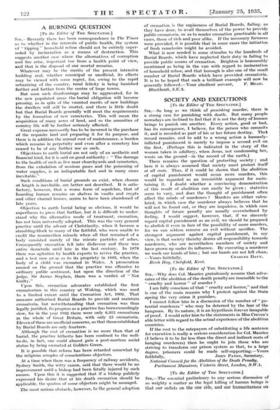SOCIETY AND EXECUTIONS [To the Editor of THE SPECTATOR.] Sra,—So
long as we think of punishing murder, there is a strong case for punishing with death. But many people nowadays are inclined to feel that it is not the duty of human beings to punish one another. Every action, good or bad, has its consequence, I believe, for the person who commits it, and is recorded as part of his*or her future destiny. That record remains, and to add to a wrong action a humanly- inflicted punishment is merely to impose a second evil on the first. (Perhaps this is indicated in the story of the woman taken in adultery, when Jesus, not condemning her, wrote on the ground—in the record of the earth.) There remains the question of protecting society ; and here it is always assumed that society must protect itself al all costs. Thus, if it could be shown that the abolition of capital punishment would mean more murders, this would be regarded as an irresistible argument for main- taining it. I doubt whether a convincing demonstration of this result of abolition can easily be given ; statistics seem to vary, and does the thought of punishment often affect the minds of murderers ? Murders are either calcu- lated, in which case the murderer always believes that he will not be found out, or they are impulsive, in which case thoughts of future penalty are usually overwhelmed by feeling. I would suggest, however, that, if we sincerely regard capital punishment as an evil, we should be prepared to abolish it even in face of the possibility of more murders, for we can seldom remove an evil without sacrifice. The strongest argument against capital punishment, in my view, is that society thereby denies all responsibility towards murderers, who are nevertheless members of society and have grown up under its influence. By executing a murderer we wash our hands of him ; but our hands are not left clean.
—Yours faithfully, CHARLES DAVY. Birch Hay, Chelsfield, Kent.
[To the Editor of THE SPECTATOR.] SIR,—Why does Col. Maurice gratuitously assume that advo- cates of the abolition of the death penalty are insensible to the cruelty and horror of murder ?
I am fully conscious of that " cruelty and horror," and that is one of the main reasons why I protest against the State apeing the very crime it punishes.
I cannot follow him in a discussion of the number of " po- tential murderers " who may be deterred by the fear of the hangman. By its nature, it is an hypothesis forever incapable of proof. I would refer him to the statements in Miss Craven's able letter with regard to the actual experience of the abolition countries.
If the cost to the ratepayers of substituting a life sentence for execution is really a serious consideration for Col. Maurice (I believe it to be far less than the direct and indirect costs of hanging murderers) then he ought to join those who are striving to transform our prison system so that, to a large degree, prisoners could be made self-supporting.—Yours
faithfully, JOHN PATON, Secretary. National Council for the Abolition of the Death Penalty, Parliament Mansions, Victoria Street, London, S.W A.














































 Previous page
Previous page